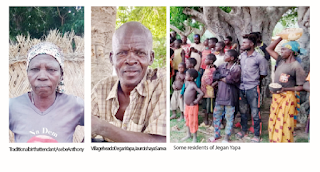Deep in the heart of Taraba State lies the hidden community of Jegan Yapa, a remote enclave where traditional birth attendants carry out a peculiar practice of testing
Tucked away in the enchanting landscapes of Taraba state’s Lau local government area lies the little-known community of Jegan Yapa. This Mumuye tribal community is untouched by modern development. Hospitals and schools are mere fantasies, and the meandering roads are nothing but a distant dream.
But what truly sets Jegan Yapa apart is the extraordinary practice of its traditional birth attendants, who go to great lengths to test the fitness of newborn babies.
Intriguingly, Asebe Anthony, one of the revered traditional birth attendants of Jegan Yapa, recently shared her fascinating insights with LEADERSHIP.
With an average of seven to ten childbirths every six months, Anthony opens a window into a world where newborns’ cries are seen as a vital sign of good health. In the absence of medical equipment, she fearlessly employs a unique technique: blowing air forcefully into a baby’s mouth to observe their response.
Anthony, who navigates the intricacies of childbirth with her bare hands or leather as gloves, highlights the challenges she faces in this unconventional setting.
In the cloak of night, she relies on a trusty torch light to guide her through the delicate process, ensuring both mother and baby are hale and hearty.
She said rags become her allies, staunching the flow of blood from delivering mothers.
But if a newborn remains silent, failing to announce their arrival with a cry, Anthony applies gentle pressure to their mouth.
“Should there be no response, another daring measure is taken—a splash of cold water to awaken the slumbering infant,” she said adding that if all efforts prove fruitless, she conveys her concerns to the community’s men, recommending further attention for the baby’s well-being.
The village head, Jauro Ishaya Sanva, sheds light on the community’s struggles as the story of Jegan Yapa extends far beyond these unique birthing practices.
He said frequent encounters with venomous snake bites cast a shadow of fear, while the relentless assault of malaria, borne by unyielding mosquitoes, affects the lives of women and children alike.
“But the absence of basic infrastructure is perhaps the most poignant issue that plagues Jegan Yapa. The lack of accessible roads, schools, hospitals, and even designated election voting points paints a stark picture of a community left to fend for itself,” he said.
Sanva’s voice resonates with the collective longing for progress. “We attempted to establish schools for our children, but the challenges proved insurmountable, and the teachers reluctantly abandoned their posts,” he lamented.
He said the absence of clean drinking water compounds their hardships, forcing them to share streams with grazing cows.
“Meanwhile, the specter of maternal complications, malaria, and snake bites continues to claim innocent lives,” he said.
The residents of this isolated community must travel over 5 kilometers to Banga Dutse, hoping to find solace in access to education, healthcare, and even a means to recharge their mobile phones.
However, it is within their very vulnerability that Jegan Yapa finds itself targeted by ruthless kidnappers, capitalising on their unprotected state.
In an unfortunate twist, politicians have chosen to turn a blind eye to their plight. Despite their unwavering commitment to participate in elections, the people of Jegan Yapa have yet to witness a single visit from a political candidate or elected representative, leaving them yearning for acknowledgment and support.
Sanva who spoke widely about the community said the lack of formal education has brought so much underdevelopment among the people and the community itself.
“We the elders are having sleepless nights over lack of formal education within this community, our children are not exposed to better knowledge, even the grown-up ones only believe that someone who is over 13 years can get married and bear children, they do not think about trade or handwork.
“None of our generation here in the community is ready to go out of the community and learn, they depend on us, if we ask them to go to town for school, they resist vehemently that we are forcing them to go and suffer.
“If this continues, we lose hope, we shall continue to remain slaves in the hands of others, as it is, we only vote, we have no one we can vote for even in the next 20 years to come,” he stated lamenting the conviction of his subjects.
The village head further disclosed that the community has fertile land for the cultivation of farm products.
He said despite the unavailability of modern agricultural farm inputs such as fertilizer and agrochemicals, harvest in the community has been so fruitful that there has been no time the community ended farming season without a bumper harvest.
“If we had the opportunity of acquiring modern farm inputs to apply on our crops, I believe farming here would have been more interesting because, without fertilizer, we still make fruitful harvests.
Amidst the desperate pleas for change, the resilient voices of Jegan Yapa rise in unison, urging government intervention. Their dreams are simple yet profound: the establishment of schools that will illuminate young minds, hospitals that will safeguard the lives of mothers and infants, and the comforting embrace of security to shield their vulnerable.
Culled from Leadership





0 Comments